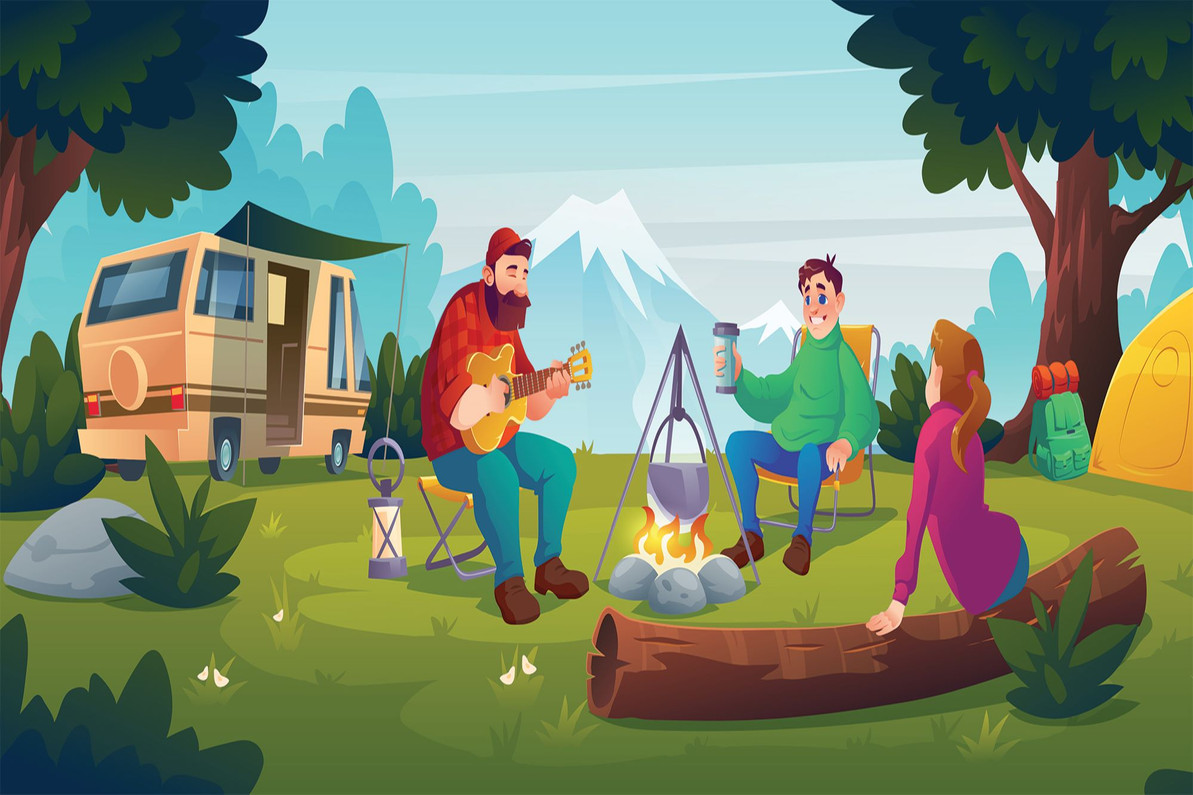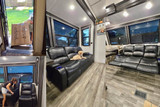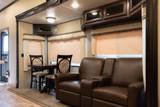RV Essentials: Gear You Need For Your First Trip | RecPro
RV Essentials For Your First RV Trip
So, you've decided to take the plunge and embark on your first RV trip. Congratulations! RVing is a great way to see the country and spend time with family and friends. But before you hit the open road, there are a few things you need to know. This blog post will cover the 15 RV essentials you need for your first RV trip.
1. A Good Set Of Maps.
Even if you're using a GPS, it's always a good idea to have a paper map. You never know when you might lose cell service, or your GPS might malfunction. Plus, it's always nice to be able to track your progress on a physical map as you travel across the country.
National Geographic makes excellent maps that are easy to read and fold up nicely, so they don't take up too much space in your RV. You could also consider getting an atlas of the current year, as an atlas is merely a book of maps.
2. A First-Aid Kit.

Medical equipment is integral to your list of camping essentials. Accidents happen, even when you're on vacation. Be prepared by packing a first-aid kit that includes bandages, antiseptic wipes, pain relievers, and anything else you might need in an emergency.
Purchasing a premade first aid kit can give you a good start on what to bring, but check the contents thoroughly to determine if there are any additional items you should include. For example, some premade first aid kits may not come with antibiotic ointment, and you may wish to have some to be prepared for minor cuts and scrapes.
3. A Set Of Tools.
You never know when something might break on your RV, so it's always good to include a basic set of tools in your RV essentials. This should consist of a hammer, screwdrivers, pliers, and anything else you think you might need to fix minor repairs on the road. You don't need to bring along an entire garage of tools, so a small toolbox consisting of basic and common tools should suffice for simple repairs and maintenance while traveling.
4. A Fire Extinguisher.
Again, accidents happen—this time in the form of fires. Suppose your cooking station has gotten out of control or your campfire has spread rapidly. In that case, you will want the RV basics necessary to be prepared. Be sure to pack a fire extinguisher in an easily accessible spot so you can quickly put out any fires that may start in your RV.
Be aware that fire extinguishers have an expiration date, so double-check before you leave on your trip. If your fire extinguisher is expired, replace it with a new one as soon as possible - they can be found in a wide variety of stores.
5. A Backup Generator.
If you're going to be boondocking (camping without hookups), you'll need a backup generator to power your RV. You will want a quiet, lightweight generator that is still powerful enough to run most appliances in your RV. While you're at it, you ought to make sure your generator is topped up with fuel and that you bring a little extra along with you.
6. Extra Propane Tanks.
If you're using a gas stove or heater in your RV, you'll need extra propane tanks to cook and stay warm while camping off the grid. Depending on your propane setup, you may only need a few 1lb bottles of propane for stoves, heaters, and other small appliances. If you plan on using many appliances, consider one or two larger tanks, such as a 20lb propane tank.
7. Drinking Water.
 It's important to stay hydrated while traveling, especially in hot weather. Be sure to pack enough drinking water for everyone in your group. We recommend at least one gallon per person per day. While your RV has a freshwater tank, this water is used for just about everything from showers and washing dishes to drinking/cooking water and toilet water.
It's important to stay hydrated while traveling, especially in hot weather. Be sure to pack enough drinking water for everyone in your group. We recommend at least one gallon per person per day. While your RV has a freshwater tank, this water is used for just about everything from showers and washing dishes to drinking/cooking water and toilet water.
Keeping a pack or two of bottled water guarantees that you have clean, drinkable water available to you should something go wrong with your freshwater tank or an emergency arise.
8. A Comfortable Place To Sleep.
Unless you're planning on sleeping in your RV every night, then you'll need some comfortable sleeping arrangements for when you want to camp outside under the stars. We recommend investing in a good camping cot and sleeping bag so you can get a restful night's sleep no matter where you are. A hammock is also a great option if you plan on doing a lot of lounging, napping, and relaxing, especially in warmer or more tropical areas.
9. Camping Chairs.
No camping trip is complete without a comfortable place to sit around the campfire. Be sure to pack some portable camping chairs so everyone has a place to relax after a long day of hiking or sightseeing. Without a couple of comfortable foldable chairs, you will end up standing around the campfire all day. Or worse, you'll end up sitting in the dirt!
10. Fun Games And Activities.
Remember to pack some fun games and activities for downtime at camp! Cards, frisbees, horseshoes, and other outdoor games are always great options. Just be sure not to pack anything too bulky or heavy that will take up too much space in your RV! Books, puzzles, art supplies, and even instruments like acoustic guitars are great options for camping solo.
11. A Lantern Or Flashlight.
A lantern is another essential item for any camping trip... but especially an RV trip! This is because RVs can be notoriously dark inside, even during the daytime hours. A lantern will provide much-needed light inside your RV after the sun goes down. Be sure to pack extra batteries so that your lantern can stay lit all night long!
A lantern or flashlight can also help light up the outdoor camping area during the night, so you will not need to rely solely on the campfire's light. Although, you should not venture too far from your campsite during the night, even with a flashlight or lantern.
12. Trash Bags.
Let's face it: trash happens when you're camping, and no one likes a litterbug! And unless you want your campsite (and RV) to start smelling like garbage, you'll need some trash bags in your arsenal of camping essentials. Make sure to pack enough bags so that you can dispose of trash properly every day. If you are camping in a location where there is no place to dispose of trash daily, consider getting scented trash bags to help stave off any odor.

13. Sunscreen.
No matter what time of year it is, chances are good that you're going to get sun while you're camping! So be sure to pack plenty of sunscreens to protect yourself (and your family) from harmful UV rays. Sunscreen will be especially useful when camping in areas such as beaches where exposure to the sun is high.
Make sure you get sunscreen with a good SPF. An SPF of 15 can block up to 93% of UVB rays, SPF 30 (the most common) blocks up to 97%, and SPF 50 blocks up to 98% of UVB rays. You can find a sunscreen with higher and lower SPFs than those listed here, so it should be easy to find the right kind for you.
14. Bug Spray.
The last thing you want on your camping trip is to be eaten alive by mosquitoes! So don't forget to pack bug spray to keep those pesky critters at bay. Mosquitos are not the only pest to worry about either. If you are camping in warmer areas, make sure to frequently check yourself, your pets, and others for ticks!
Checking for ticks and using bug repellent to keep mosquitos away will not only lead to a pleasant camping experience but keep you safer as well since mosquitos and ticks can carry awful diseases and pathogens such as lime disease.
15. Cooking Supplies.
Even if you don't plan on doing much cooking on your trip, it's always good to have some basic cooking supplies included in your camping essentials—just in case. This includes non-perishable food items like canned goods and dry cereal, as well as pots, pans, and dishes. Canned foods and dry cereal ensure that you have some source of food should other options run out. If all of your food is perishable and your RV refrigerator stops working, you won't have anything to eat, so it's good to have some sure-fire alternatives, just in case.
It's always nice to cook food with the campfire, but without some basic cooking supplies, your culinary capabilities will be pretty limited. That doesn't mean you need to bring along the entire kitchen, either. A few pots, pans, plates, bowls, and cups should suffice as well as a few forks, spoons, and knives to cook and eat with.
Phew! That was a lot of information! But don't worry—we promise it's all worth it once you hit the open road on your very first RV trip. With these 15 RV essentials, you'll be prepared for anything that comes your way—guaranteed! So what are you waiting for? Start planning your dream RV trip today!
Recent Posts
-
Traveling to the RV Hall of Fame in Elkhart, IN
If you are traveling to Elkhart, IN to see the RV Hall of Fame, getting off the toll road at exit 96 …Nov 14, 2025 -
Best RV Air Conditioners of 2025: An Expert Guide From RecPro
Quick Answers Best overall RV air conditioner: RecPro 15K Quiet AC with Heat Pump (RP-AC3800) Best f …Oct 29, 2025 -
The Nuclear Nomads Expand Sofa with New Recliner Section Install
The Nuclear Nomads are a full time RV family living in south Florida. Andi and Joey value quality ti …Oct 24, 2025 -
Trailer Wiring Guide: How to Wire Your Trailer for Safety and Efficiency
Table of Contents 1. Common Types of Trailer Connectors 2. Trailer Wiring Diagrams: Color Codes and …Aug 20, 2024 -
How to Keep Your Pets Safe While Camping
RVing and camping are a great getaway from the hustle and bustle of work and the city and the day-to …Jul 02, 2024 -
Why Replace Your RV Furniture?
You may wonder when is the best time to replace your RV furniture. There is no one right answer to t …May 20, 2024







